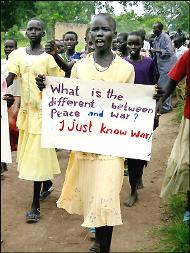Europe urged to do more to aid southern Sudan’s reconstruction
By RAWYA RAGEH, Associated Press Writer
SOUTH BOR, Sudan, Sep 12, 2004 (AP) — Europe must immediately increase aid for reconstruction efforts in civil war-ravaged southern Sudan and not wait until this country’s government and rebels achieve comprehensive peace, American, U.N. and local officials said Sunday.
 The calls came as the head of the United States Agency for International Development tours southern Sudan, where a 21-year conflict between government forces and rebels has left 2.5 million people dead, mainly though disease and starvation.
The calls came as the head of the United States Agency for International Development tours southern Sudan, where a 21-year conflict between government forces and rebels has left 2.5 million people dead, mainly though disease and starvation.
Kezekia Ruei, commissioner of the rebel-controlled Upper Nile rebel-controlled area of South Bor, some 150 kilometers (93 miles) north of southern capital Juba, said European states must start taking an interest in the south’s problems.
Damage caused by the war and a lack of government funding since has depleted health services, left infrastructure throughout in a poor state and , which include poor drinking water, health services and infrastructure.
“The Europeans must come and see the situation to know by themselves,” said Ruei told The Associated Press. “This is the time for reconstruction, they (Europeans) cannot just wait and watch the Americans help us.”
Peace talks to end the war, which is separate to the 19-month Darfur conflict in western Sudan, started in July 2002 between the government and the rebel Sudanese People’s Liberation Army.
The International Committee of the Red Cross has said a final agreement, plus financial aid, in the south has been delayed by the conflict in Darfur, where state-backed Arab militia are blamed for killing an estimated 30,000 African villagers and driving more than 1 million from their homes.
U.S. officials say Washington, along with Norway, are among the few to be sending aid to southern Sudan, with American contributing US$210 million (A?171 million) and Norway about US$30 million (A?24 million) in 2004.
But they, along with the U.N.’s food relief agency, complain that Europe is holding out on sending aid until a comprehensive peace agreement is reached in the south.
USAID chief Andrew S. Natsios said he will write to European counterparts urging them to help fund southern reconstruction.
“It will undermine the peace process if reconstruction does not start now,” Natsios said.
The southern war has damaged vital infrastructure in towns and cities throughout the region, which is rich in oil and inhabited by Muslims, Christians and Sudanese of animist beliefs.
In addition to the war, South Bor has been hit by an internal conflict within the Sudan People’s Liberation Movement, the rebel’s political wing.
In 1991 a faction broke away from the movement and sparked fighting between rebels here that was more destructive than the war with the government, primarily because it is the home area of rebel chief John Garang. The fighting killed thousands and displaced many more.
Southern rebel factions reached a peace agreement in 2000 and the SPLM regained control. Since, thousands of internally displaced persons have returned, swelling the population to its current level of 160,000.
The U.N.’s World Food Program supervises a road reconstruction program, one of the area’s largest aid projects, believing improved roads will decrease the need for food aid by increasing trade and self-sufficiency.
“But the (European) donors who have promised us funds redirected that to Darfur, “WFP logistics officer Barbara Van Logchen said.
Van Logchen said 80-85 percent of aid is flown in by air at a “tremendous cost,” but having roads would cut costs by “40-60 percent.”
